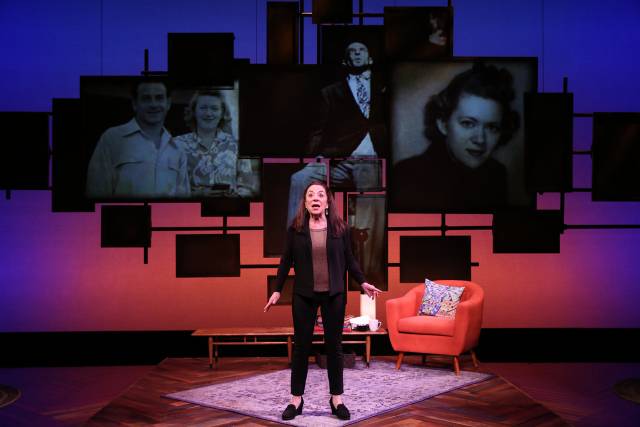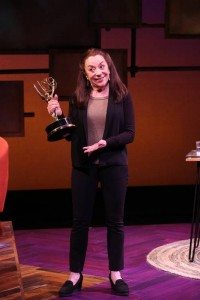

A snide comment from a fellow seven-year-old launches an identity crisis for young Monica Piper when her neighbor asserts that skipping temple means she’s “not that Jewish.” In her hilarious one-woman show, named after said snarky comment, Piper explores what it means to be Jewish by recounting the story of her own family, from her childhood to her own search for a family as an adult. With plenty of funny commentary of her own, she uncovers her understanding of her familial roots.
Those roots, brought up by funny parents, led Piper to a career in stand-up comedy, and when she became a parent herself she transitioned to writing for TV, ultimately winning a Daytime Emmy for her work on Rugrats. She talked to us about adapting her life for the stage, and transitioning from comedian to actress to bring her story to life.
The show’s focus on family is so beautiful, and I loved the cyclical way you approach describing first your home life as a child, and then moving towards your experiences as a parent. Why did you decide to tell your story through this lens of family?
I wanted a thread to connect several stories. I needed an arc. A lot of one-woman shows, especially by comedians, tend to be stand-up with furniture. I wanted this to be very different from stand-up, but equally as funny, but also as moving. I wanted it to be a real play, about something. Through the last five or six years prior to writing this, I had started writing original stories for the Jewish Women’s Theater in LA. Their focus is cutting edge writers writings stories that dispel the stereotypical idea of the Jewish woman. I started writing a bunch of stories, and performed them, and they became very popular. One of the patrons said that they would just love to see a long form, to see this turned into a play somehow.
So I had to find that thread. It had to have a beginning, middle, and end. And I realized all these stories I wrote really dealt with family. They dealt with my growing up with funny parents, then me wanting to have a family, but two failed relationships. It seemed that every time I’d write a story, one was about my grandmother, one was about my really funny father, and then I wrote a really funny story about having cancer and a teenager at the same time. There was actually a moment when he was so obnoxious as a teenager that I said to a friend, “Do you know anyone else where cancer is not the worst thing in the house?” That’s how bad he was. But the beauty of that was that when I did get sick, he really was forced to get out of his own teenaged ego-centric head and really find his kindness, and emerge as a mensch.
Your descriptions of parenthood are hilarious and really touching. Has being a parent affected the way you approach art and comedy?
I think any really good comedy, stand-up especially, is based on the notion that it’s truth, and that the audience relates to it because it’s familiar. It’s something they know all along, but you’re the one that puts it in front of their face, and with a slightly comic twist. Parenthood, just like relationships, owning a pet, the funny things that humans do, even silly bodily functions – if the audience can relate, it’ll be funny. When I do the part in the play about my son thinking I’m an idiot, everybody, not only parents, but teenagers in the audience crack up, because they recognize it. So I think parenting is so rich with material. There was richness in the idea of a single mother, and a female comedian at a time when men didn’t think women were as funny as they were, all the time traveling with a baby to comedy clubs. You just have to find the funny. In all of life, you’ve got to take what’s in front of you and see what’s funny about it.
 One of the toughest parts of the show is your description of your experience with breast cancer. How has that experience impacted you as an artist, a comedian, and a parent?
One of the toughest parts of the show is your description of your experience with breast cancer. How has that experience impacted you as an artist, a comedian, and a parent?
As ever, you have to find the funny. It’s during times like that. Towards the beginning of the play, my goldfish dies when I’m six. My father tells me this story about a priest and a rabbi and a minister all being asked by a journalist what they want said at their funeral. And they all go on and on, and then the rabbi says, “That’s easy. ‘Oh my God, he’s moving!’” Like, okay he’s not dead! I’m trying to make sense of this at six years old, and I’m trying to get the joke and why my father told me this joke, and what I took away from it then is that the Jew was the funny one. And then later in life, I realized that joke also says that Jews are funny even facing the dark stuff.
So later, when I’m talking about the cancer or even earlier when I’m talking about my mother’s Alzheimer’s or her dying, when my father and I are alone in the apartment, I said, “Dad we gotta find a way to laugh.” So the whole idea is, you show people that even cancer, even death, you can find the funny stuff about it. I think this show is a way of showing people how to do that, without preaching about it. Just being it, doing it, showing them that everything, even cancer, can be funny. If you can laugh at something, you know you’re going to be okay. I don’t mean necessarily a health thing, but like when my father and I were able to laugh when we were sitting Shiva after my mother died, I knew that it was so important that we let ourselves know that we could still laugh, that my other would have liked it if we could find a way to laugh. When you laugh at the dark stuff, it tells you that, maybe not today, and maybe not tomorrow, but eventually, you’re going to be okay.
The show goes through some of those darker moments in your life. What’s it like to tell such an intimate and vulnerable story?
For a comedian, for someone who’s done stand-up for 30 years, in the beginning, it’s very scary, because it’s so different from stand-up. In stand-up, you’re kind of expected to get a laugh every ten seconds. That’s another reason I realized how much I wanted to do this, because for me, in order to get to the truth, you had to allow yourself the vulnerability of being. I knew that in order to get to the truth, I’d have to be able to go a page without getting a laugh. That’s very intimidating, for a comedian. But, it isn’t for an actor. I really love making the transition from comedian to actress, and not being afraid at all to be vulnerable. You use the word intimate, and that is exactly what I create in this show. That was, and is, the goal – to create an intimate and inspirational, but really funny, evening. People have come up to me afterwards and said, “It’s weird, I feel like you’re my friend. I don’t feel like you’re acting at all, it just feels so intimate.” I’m thrilled when I hear that.